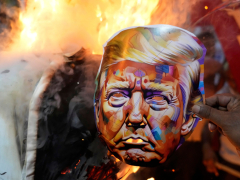A United States appeals court has declared President Donald Trump’s blanket tariff policy illegal, but it stopped short of pausing the wide-ranging import taxes altogether.
On Friday, the Court of Appeals for the Federal Circuit in Washington, DC, largely upheld a decision in May that found Trump had overstepped his authority in imposing universal tariffs on all US trading partners.
Trump had invoked the International Emergency Economic Powers Act (IEEPA) to justify the move, claiming that trade deficits with other countries constituted a “national emergency”.
But the appeals court questioned that logic in Friday’s ruling, ruling seven to four against the blanket tariffs.
“The statute bestows significant authority on the President to undertake a number of actions in response to a declared national emergency,” the court wrote.
“But none of these actions explicitly include the power to impose tariffs, duties, or the like, or the power to tax.”
The Trump administration is expected to appeal to the Supreme Court, and the appeals court therefore said his tariff policy could remain in place until October 14.
That was a departure from the May ruling, which included an injunction to immediately halt the tariffs from taking effect.
What is this case about?
The initial May decision was rendered by the New York-based US Court of International Trade, a specialised court that looks exclusively at civil actions pertaining to cross-border trade.
That case was one of at least eight challenges against Trump’s sweeping tariff policies.
Trump has long maintained that the US’s trading partners have taken advantage of the world’s largest economy, and he has depicted trade deficits – when the US imports more than it exports – as an existential threat to the economy.
But experts have warned that trade deficits are not necessarily a bad thing: They could be a sign of a strong consumer base, or the result of differences in currency values.
Still, on April 2, Trump invoked the IEEPA to impose 10-percent tariffs on all countries, plus individualised “reciprocal” tariffs on specific trading partners.
He called the occasion “Liberation Day“, but critics noted that the global markets responded to the tariff announcements by stumbling downward.
A few days later, as the “reciprocal” tariffs were slated to take effect, the Trump administration announced a pause for nearly every country, save China. In the meantime, Trump and his officials said they would seek to negotiate trade deals with global partners.
A new slate of individualised, country-specific tariffs was unveiled in July in the form of letters Trump posted to his social media





